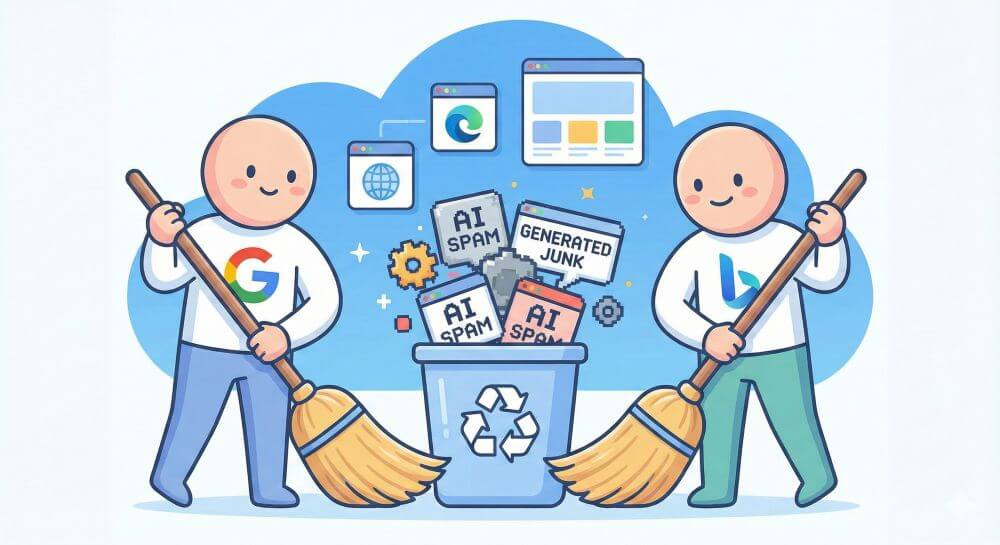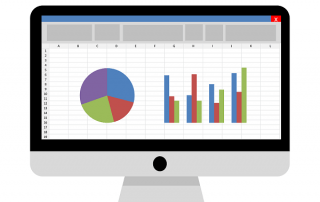Google & Bing delete billions of AI spam pages
November 28, 2025
While the world hunts for discounts, one of the most radical changes of the last decade is taking place in the engine room of the internet. In an unannounced but apparently coordinated action, Google and Microsoft (Bing) began today to massively clean up their search indexes. Experts are already talking about the “SEO Apocalypse 2025.”
The End of the “Dead Internet”: The Background
Since the release of powerful text generators (such as GPT-5 and Gemini Ultra) in 2024, the World Wide Web has been subjected to an unprecedented flood. So-called “content farms” use automated agents to generate millions of articles daily, all serving one purpose: to generate advertising revenue through clicks.
The Problem: These texts are often flawlessly written, but devoid of content. They repeat well-known facts, inflate 50 words of information into 2,000 words of text, and clog up search results for legitimate queries.
“We reached a point where, for some search queries, not a single human-verified sentence could be found on the first three pages of results. The internet was threatening to choke on its own noise.” – Dr. Elena Rostova, Chief Analyst for Search Quality at Forrester Research.

The weapon: “Semantic Density Filters”
The extent: A digital devastation
Initial data from SEO tracking tools reveal the massive scale of the event:
Visibility Crash: Large networks of niche websites (e.g., “https://www.google.com/search?q=Bester-Toaster-Test24.com” or generic health blogs) lost 95% to 100% of their visibility within four hours.
Billions of Deleted URLs: Search Engine Land estimates that by evening, approximately 15 to 20 billion unique URLs worldwide will disappear from indexes. This equates to roughly 10-15% of the indexable web.
Traffic Shift: Established media brands, forums (such as Reddit), and verified expert blogs are experiencing an immediate surge in traffic as the “spam competition” disappears.
Collateral damage and criticism
As with any major algorithm update, there are innocent victims here, too. Webmaster forums are already seeing reports from operators of small hobby blogs who have also been removed from the index.
Critics argue that the “Semantic Density Filters” are set too aggressively and penalize even flowery or verbose human writing styles as “AI rambling.” Google has already announced that it will provide a form for manual reviews in the coming days, but for many small businesses, this could come too late!
A Return to Quality?
November 28, 2025, marks a turning point. Flooding the internet with generated content for “free” is no longer a viable business model. Search engines have signaled: Those who want reach must once again provide genuine, concise, and relevant information—regardless of whether it’s written by humans or machines.
Sources:
- Google Search Central Blog: “November 2025 Core Update”
- Microsoft Bing Webmaster Blog: “Clean Web Initiative”
- Search Engine Land: “The Great De-Indexing”
- TechCrunch: “The Dead Internet is being pruned”
- Image material: Google Banana Pro
Beliebte Beiträge
Create annual calendar 2022 in Excel
In our tutorial we describe how you can create an annual calendar for 2022 with a display of the calendar week and public holidays in Excel, and use it anew every year.
Create individual charts in Excel
Charts are created quickly in Microsoft Excel. We explain how you can customize them, and also swap (transpose) the axes.
Create professional letter templates in Word
How to create a professional letter template with form fields in Microsoft Word, and only have to fill in text fields.
Create a digital signature in Outlook and Word
Create a digital signature in Microsoft Outlook and Word for more security.
Create a Table of Contents in Word
To create a dynamic table of contents in Microsoft Word - Office 365
Use bookmarks and cross-references in Word
How to use text markers to make your Word document dynamic and click through your pages.

































